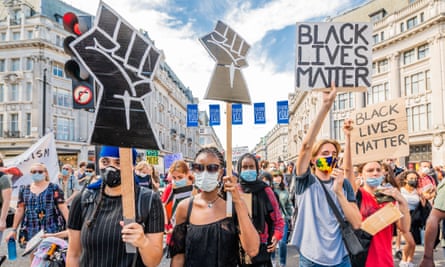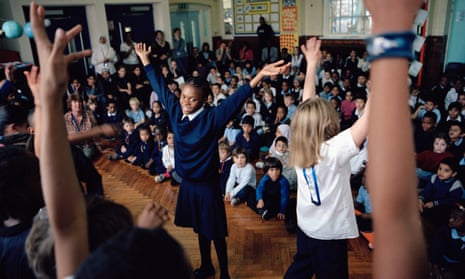Black History Month is an American import, a concept brought to Britain in the 1980s. In the US, it is celebrated in February and began life as Negro History Week in the 1920s. Transplanted from there to here it has slowly grown to become a modern tradition, an established part of the calendar for many people of all races.
In the 1980s, everyone in Britain, including black people themselves, knew less about black British history than we do today. Much of the key scholarship had yet to be done, many of the discoveries yet to be made. So as well as importing an American tradition much of its content was also brought to Britain.
Back then, Black History Month events were more likely to remember Rosa Parks and the Montgomery, Alabama, bus boycott than they were to shine a light on the Bristol bus boycott and the British colour bar. Thirty-three years later and Black History Month has both evolved and matured. It is bigger, better funded, stamped with the imprimatur of official approval and more firmly focused on British history.
But while Black History Month was establishing itself as a new tradition, a parallel tradition was also developing. It has long been obligatory, it seems, for Black History Month to be dismissed and denounced in ways that would be utterly unimaginable for, say, Holocaust Remembrance Day. Each year, it is labelled “politically correct” and in 2018 there were calls for it to be made into a broader celebration of wider diversity, effectively BAME History Month. One council went as far as rebranding its events under the banner “Diversity Month”. And every year, as regular as clockwork, as inevitably as death and taxes, Black History Month is greeted with the same fatuous and disingenuous claim that it is somehow unfair, as there is no white history month, a ploy every bit as cynical as the phrase “All lives matter”.
What makes Black History Month contentious in the UK is not the “black” part, but the “history” bit. If it were black culture month or black music month, few people would have a problem. The issue is that any proper debate about black history inevitably entails discussions of parts of the British past – slavery, imperialism, the development of racial thinking – that have long been brushed under the historical carpet. This means that once a year black Britons become the delivery system for parts of British history that many people are deeply uncomfortable discussing.
Q&AWhat is Black History Month?
Show
Founded by Akyaaba Addai-Sebo, the first Black History Month in the UK was celebrated in October 1987. He conceived it as "an annual celebration of the contributions of Africa, Africans and people of African descent to world civilisation from antiquity to the present".
It took its cue from the established Black History Month that had taken place in the US every February since it was first adopted by staff and students at Kent State University in Ohio in 1970, and which had built into a national movement.
Its origins go back to 1926, when the second week in February was designated as a week to celebrate and discuss African-Americans' contribution to history.
One of the key reasons for starting Black History Month in the UK was the under-representation of Black people in the mainstream British history taught in schools, and to ensure that the history and heritage of the African diaspora was preserved and celebrated.
See our interactive timeline of 2,000 years of Black history from around the world
This year, the attack line has been that Black History Month and black history itself is divisive. The same government that officially supports Black History Month has warned schools not to teach what it characterises as “victim narratives” that are supposedly “harmful to British society”. The favoured version of black history focuses only on the “contributions” of black soldiers, sailors and airmen who served in the armed forces and pioneering black “firsts” in civilian life. Slavery, racism and the murderous violence of empire are pushed to the margins.
This year, like every year, there have been those unable to control the reflex to vomit up the “where’s white history month” trope – like a racist fur ball – but overall there has been less criticism. Black History Month 2020 feels more confident and celebratory than those of previous years; the celebrations of 2018 and 2019 were muted affairs, coming as they did in middle of the Windrush scandal and its aftermath.

This positivity is a reflection of the year we have lived through and the remarkable events we have witnessed. The summer of 2020 was one of those moments when it felt as if history’s fast-forward button had been pressed and the pace of historical events suddenly accelerated. After the summer of Black Lives Matter, it seems as if every institution and every company is determined to express its support for Black History Month.
The scale of Black History Month, the fact that political leaders and huge corporations feel compelled to play a part and list their initiatives, is in itself an achievement, one that would have been unimaginable to the pioneers who put together the first programmes of talks and gatherings back in the 1980s.
That a royal couple would also seek to play a role would have seemed utterly implausible. Undoubtedly there are companies whose support is paper thin and motivated by self-interest, but there are others where the desire to celebrate and to change is genuine.
While criticism of the existence of Black History Month has been muted, companies and individuals have found themselves condemned for doing it wrong. Uber Eats celebrated the arrival of October with a pratfall of an advertisement that showed a black women eating chicken. Not being able to see the problem with that is the problem.
But despite the gaffe, the underlying aim of the company’s initiative was, as a spokesman explained, to “make it easier for people to support black-owned restaurants”. If this really is the ambition behind the promotion, might we not, for the greater good, forgive the clumsy messaging and the triggering of an old and ugly stereotype?
Also in line for criticism were the Duke and Duchess of Sussex who marked the start of October by condemning structural racism, unleashing a predictable broadside of hysteria. Attacking Meghan for wanting to combat the racism that exists within British society, when the vilification of her is, in part, a manifestation of that racism, represents a new form of meta-irony, a rare and previously unknown element in the periodic table of tabloid hypocrisy.
Despite the gaffes and the sniping, Black History Month 2020 is infused with the spirit of this remarkable year, one in which millions of people have engaged with ideas of race and racism as never before. A year in which books on race and black British history have been in the bestseller lists and the concept of “anti-racism” has caught the imagination of the young. 2020 might therefore be the year in which Black History Month truly comes of age.
David Olusoga’s Black and British: A short, essential history has just been published
To buy the Guardian’s Black history wallcharts, visit the Guardian bookshop and use code 15CHART for a 50% discount








